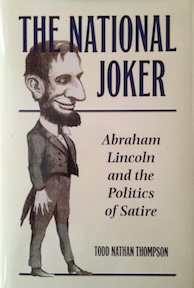“The National Joker” is Serious Stuff: An Interview with Todd Thompson

Todd Thompson didn’t start out as a Lincoln man. An English professor at Indiana University of Pennsylvania, Thompson has long been interested in satire and humor. But a few years ago, Lincoln’s sense of humor caught his attention, and Thompson got hooked. His new book, The National Joker: Abraham Lincoln and the Politics of Satire, takes a serious look at Lincoln’s laughing matters.
“Lincoln, time and time again throughout his political career, repurposed jokes for political ends, in the process transmuting humor into satire,” Thompson writes in Joker, which looks at the many ways Lincoln used satire: from making an indirect point about a controversial topic to making fun of himself in order to take the sting out of attacks from his critics. “Satire is a way to offer political education,” Thompson added during a phone interview earlier this month.

“I came at this not as a Lincoln scholar but a scholar who studies humor,” Thompson explained. “The Lincoln stuff was a smaller part of my study of satirist-statesmen.”
But Lincoln was THE ultimate satirist-statesman, Thompson discovered—a prominent national leader who used humor as a political tool. “That the central figure in American history was also its ultimate satirist-statesman, whose satiric discourse was also his political discourse, speaks to the heretofore unexamined prevalence and power of political satire in nineteenth-century America,” Thompson points out in Joker.
And that led Thompson into the Lincoln rabbit hole.
“It changed me from someone who studies modernism to someone who studies the 19th Century,” Thompson said. “That’s the thing about the time period—the politics are always there, right on the surface.” As a result, looking at Lincoln and his use of humor really offers an insightful look at America itself. “Satire is an articulation of who we are,” Thompson explained. “It offers a reflection of us as a nation.”
Thompson offers a formal definition of satire: “an aesthetic attack mounted in a humorous or playful tone through literary indirection (e.g. metaphor or allegory or hyperbole) against a public figure, policy, or idea.” The key elements, he says, are attack, indirection, and public-ness. “Satire can use humor, can be humorous,” he explains. “Humor becomes satire, for me, when it becomes attack and becomes public.”
Thompson cites an example from Lincoln’s campaign against Stephen Douglas: “When Lincoln repurposes a nonpolitical joke in a speech to mock Douglas’s policy positions, he takes that joke out of the realm of humor-only and into satire.”
“I’m interested in that fuzzy border between humor and satire,” he says.
Lincoln proved to be such a fascinating subject not only because of his own love of and use of humor but because the times themselves were so steeped in it because printing technology made reading material so widely available. Political cartoons were on the rise because new engraving technology was emerging. The political atmosphere was hypercharged. “To do a ‘responsible reading’ of Lincoln’s jokes, I had to peel back all the layers there,” Thompson explained.
Lincoln intentionally portrayed himself as a homespun frontiersman—what Thompson calls “consciously performed rusticity”—but he was actually a ravenous consumer of the written word. “He was a newspaper junkie. He loved joke books. He immersed himself in print culture in a way a western lawyer would not be expected to be,” Thompson said. “He was incredibly media savvy.”
He was also incredibly politically savvy. “People want to see the legend of Lincoln as being above the politics,” Thompson said, “but Lincoln was very much a politician. And I think that’s okay.”

Thompson was also impressed by what he called Lincoln’s “humanity.” “Maybe I already knew this a little,” he conceded. “But reading his notes and the things he wrote, I could see his quiet reflection and thoughtfulness. . . . I’m not a biographer. I don’t know that we can really know his inner life, although plenty of people try. But you can get a feel for it if you read a lot of his material.”
In fact, that relates to one of Thompson’s concerns about the book. “I was nervous about presenting this as ‘another Lincoln book’ or ‘another Lincoln biography,’” he admitted. “Historian Jason Silverman has written that a new Lincoln book comes out every five days. You wonder what more is there to say about Lincoln—but there is!”
Indeed, because of Thompson’s interdisciplinary approach, The National Joker adds some fascinating insights to the Lincoln literature. “I was a little nervous as a literary scholar writing a book that’ll be read mostly by a history audience,” he conceded. The book, though, opens great new understandings of Lincoln for history buffs.
In most cases, if you have to explain why something’s funny, you ruin the joke. But in Thompson’s case, explaining Lincoln’s humor only deepens one’s appreciation for Lincoln’s powerful intellect and rich gifts for language. The National Joker is seriously interesting stuff.